The state of Twitch in 2022: Too big to fail
The king of streaming continues its rule.
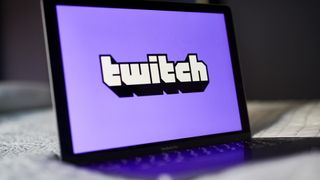
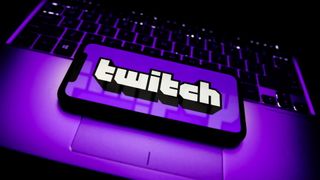
Across early 2022, we've been taking a look at the major games, genres and platforms that make PC gaming to see where they're at this year.
Twitch, though others have tried to challenge its domination, is the most successful streaming platform right now. Facebook and YouTube still linger just outside of the limelight as Amazon's livestreaming service continues to serve millions of users, streamers, and companies every month. But that's not to say the service is perfect. Far from it in fact. But in 2022, Twitch is a complicated machine of good intentions marred with flawed executions.
Again and again Twitch has faced crises. The hate raids were the most high-profile long-term issue, wherein streamers (the majority of which were people of colour and/or part of the LGBTQ+ community) received a huge influx of bot viewers spewing hatred towards the streamer. Other controversies and metas rule the site's perception among the masses, like the rise of the yoga ASMR streams or hot tub meta. And let's not forget that Twitch leak at the end of 2021, revealing a huge amount of private payout information of the site's streamers as well as the site's source code.
During the pandemic, Twitch grew even larger than it ever was before. More viewers, more streamers, more engagement. Now the world is opening up once again, that growth has stagnated a little. It was always inevitable but now Twitch's boom has slowed and streamers are taking stock of what's to come and what they really want from the platform. So how is Twitch faring in 2022?
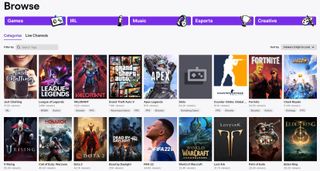
How is Twitch doing right now?
Depends on who you ask. If you're talking about the company, I imagine it's doing very well. The pandemic brought a lot of business and a lot of new viewers and streamers. Additionally now people work from home, it's not uncommon for individuals to watch streams while they're working. I know I've done this, just as I would listen to music as I work or the radio and many others do too.
Twitch is proud of its achievements, and has a dedicated page breaking down its stats. Right now the page says 2.5 million people are watching Twitch "right now". In 2021, 15 million people tried streaming for the first time. 1.3 Trillion minutes of content was watched in 2021, with an average of 31 million daily visitors. These numbers are unfathomable. So huge it's hard to quite understand just how many people and how much time people sink into the site. Twitch also prides itself on its young audience, saying 75% of its viewers at between 16 and 34. Its influence is astonishtingly huge.
According to Backlink.io, there are about 150 million active users each month on the platform, 7.4 million of which are active streamers (though Twitch says it's 8 million). Information from Twitch Tracker shows that the platform is retaining a lot of the boom caused by the pandemic which means there are more viewers and content than ever before on the platform.
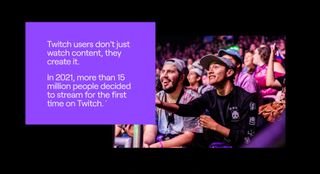
1.3 Trillion minutes of content was watched in 2021, with an average of 31 million daily visitors.
Twitch has lost some big-hitters like Ludwig and Sykkuno to its main competition, YouTube, but the huge amount of content being uploaded to Amazon's site every day makes it feels like the two sites fulfil different content purposes. If you're going to YouTube to watch a streamer, you're going for a very specific person and a love of their content. If you're watching someone on Twitch you're there for a combination of personality and the wider community. Flicking between channels, off-the-cuff collaborations, raids to other streamers—there is a fuller sense of place to Twitch then YouTube.
The biggest gaming news, reviews and hardware deals
Keep up to date with the most important stories and the best deals, as picked by the PC Gamer team.
YouTube does have its advantages like properly storing streams once they're over, and being a one-stop platform for content: whereas Twitch streamers still need to use YouTube to upload edited content.
Twitch is pretty healthy all things considered. It's so conjoined with the idea of streaming that although there are issues with the platform, streamers are willing to tolerate them with the hope that the company listens to their concerns and ideas.

What's been happening recently?
Perhaps the most recent controversy surrounding Twitch were potential plans to make the revenue split worse. Speaking as a streamer myself, the monetisation of the platform isn't great. Subs, prime subs, gifted subs, bits, donations; there is a lot to take on-board with Twitch's monetisation methods but the main issue is that the money that goes to the average streamer is 50/50. And when the advertising money is as bad as it is on Twitch, this puts some full-time streamers in perilous positions, especially after making subscriptions cheaper in areas like the UK.
So smaller streamers (and by that I mean everyone that's not a partner with hundreds of viewers) have been upset at this system for a while. Streamers want a 70/30 split. Instead discussions were reportedly happening of making the large partner split, which was 70/30, also 50/50.
Additionally, according to the Bloomberg report, there may be partner tiers and these contracts may allow the platform's biggest names to stream elsewhere while in contracts with Twitch. Nice for those in active conversations with Twitch but less nice for people this never affects, and the revenue split would maybe silence arguments for a better split for small streamers. The running of Twitch, all those servers, is expensive of course, but there are many that want to make Twitch their job. The profit of Twitch is at odds with growth of its smallest communities.
Are the streamers happy?
Streamers come in all shapes and sizes but no matter who you are on Twitch, you'll have a critique of the platform, and depending on your aims, particular frustrations. Starting with the smallest streamers, discoverability is still a massive issue on the platform. Showing people why they should watch you is hard when you might not be able to get them to click. There are thousands of streamers live at any one time with less than ten viewers, so standing out from the crowd is hard.
Mid-tier streamers have their own issues with monetisation and perhaps making streaming a career. With monetisation changes it's hard to fund an entire life from streaming, and growth is also difficult when it seems to depend on virality on TikTok or YouTube.
The profit of Twitch is at odds with growth of its smallest communities.
For big streamers though, life seems to be pretty swell. They'll have opportunities to go elsewhere if the right contract arises but being at the top of Twitch, aside from inter-streamer drama, seems pretty great right now.
I spoke to three streamers at the beginning of the year about the state of Twitch; Rek it Raven, Ashley Roboto, and EllieJoyPanic. All three had valuable perspectives to share about the platform. Rek it Raven was at the very centre of the Twitch hate raids as a person demanding updates and progress on their prevention. EllieJoyPanic is a prominent charity streamer, raising thousands each year for good causes. Ashley Roboto is a Twitch Ambassador and expert in discoverability beyond Twitch, with huge followings on other apps like TikTok.
Discoverability issues
Perhaps the biggest continued issue Twitch streamers have echoed is about discoverability. If you're just starting out streaming it's incredibly difficult to make a dent in the algorithm. The site itself isn't great at encouraging people to try out new content or the content of smaller streamers, in part because the overall quality of large partners will be on average higher, and when you get to the smallest streamers on the platform there are thousands to choose from. There is no simple solution to this. No single answer to help the talented streamers at the very bottom gain an audience. There is an element of luck to the success of any big streamer but what you can influence are other platforms.
Ashley Roboto, for example, has YouTube content to go along with her streams. But the shout-out she gives to TikTok just amplifies how that particular platform is now giving streamers a huge boost. She says: "YouTube and TikTok have way better discoverability. TikTok specifically has done wonders for my streaming career. Most people that come to my streams for the first time are like "hey I came in from TikTok", like "hey I saw your TikToks"! It's really rare to get someone coming in from anywhere else other than TikTok."
And she's not the only one. A streamer by the name of FrtingGlitter has gone viral on the Valorant and gaming portion of TikTok of late. Her funny appearance with a potato filter combined with an infectious laugh, hilarious quips, and great editing has got her platform to boom. She went from an average of 43 viewers in July 2021 to 2422 in April of 2022, according to Twitch Tracker. Watch any of her streams and you'll see many viewers comment that they found her through TikTok not through Twitch. The success of new streamers depends on the success of other platforms which is an unusual circumstance and not one Twitch seems overly concerned about.
Diversity efforts
The most I think I see Twitch talking about its individual streamers actively is through their monthlong celebrations of certain groups on the platform. Black History Month (both the American and British versions) are celebrated by putting people of that community on the front page and creating advertisements for these streamers displayed in Times Square in New York. There are a variety of these months for Women, Pride, and AAPI communities in an effort to show support for the diversity the platform has on it.
As someone who has been part of the Black History Month streams personally, they're a massive honour to know Twitch knows who you even are but especially during the hate raids of 2021, it felt as if the platform could be doing more. As Rek it Raven says: "Twitch could be doing more. Twitch needs to be doing more. Like the Black History, Womens' History, AAPI, all that stuff is great, it's cool, it's a start but that shouldn't be it. If you're going to claim to promote diversity, inclusion, so on and so forth, do it. Not just in the months that you're 'allowed' to because it's marketable."
These months are a great start in terms of acknowledging just a slice of the people who come and stream on Twitch every month, but when the very top tier of your streamers aren't reflecting that diversity it begs the question of how Twitch shows the world that anyone can find a home on the platform.
Ashley Roboto in turn says: "I love that they've started to do those months. I love that they afford people the opportunity to have their face on a billboard in Times Square. That's so cool and so wonderful.
"I feel like this past year, they missed out on Indigenous Heritage Month, they just kind of clammed up about that, never really said much despite a lot of people on Twitter talking about it. There is always more room to do more I guess. It's great what they're doing, I love that they're doing stuff for people. I think that that's frickin awesome, I love that they're picking creators and giving them opportunities and getting them in front of more people because a lot of the time it's just a lot of white people that get audiences on Twitch and on YouTube."
Multitalented, Multidimensional, and Multifaceted. Tune in and recognize all that Asian and Pacific Islander Creators bring to Twitch. pic.twitter.com/UAkHsAIFEuMay 2, 2022
Bans
Twitch could be doing more. Twitch needs to be doing more.
Rek it Raven
If you know Twitch then you know the largest conversations often arise out of bans. Who is banned, how long they're banned for, why they got banned in the first place. The rules on bans are in constant fluctuation and it's incredibly difficult to find where a line is. There have been high-profile bans like Destiny or Dr Disrespect in the past, where the subsequent fallout has seemingly permanently ended any commercial relationship. And then there are other streamers that dance around bans because they're well behaved 99% of the time and streamed copyrighted anime to seemingly make a point.
There are those that think bans are unwarranted for hate raids against large streamers, and then those that want them implemented against yoga ASMR streamers as a whole. It's the biggest threat and controversial line in the Twitch playbook.
When asked, Ellie said the one thing she'd change about Twitch are uniform ban parameters. "The most frustrating thing that I see is people going into chats and spewing hatred and vitriol not getting banned and then people who do nothing wrong getting banned. That is incredibly frustrating."

Is Twitch still the best place to stream?
For beginners, it certainly is. Streamers on Twitch bleed purple through and through. Rare is it that someone leaves Twitch to go to YouTube or Facebook Gaming because doing so can feel as though you're removing yourself from the hub of streaming. Though the streamers I asked had clear criticisms of the platform, they all confessed that if they started from the very beginning, they'd do it all again on Twitch rather than its competitors.
Ashley says: "Doing it all again, I would still pick Twitch. I feel like Twitch helped me really hit the ground running in regard to content creation."
Raven says: "From a strictly business standpoint, yes. Twitch is leading the game in live streaming. Like we've seen other sites try to do it and we see other people trying to catch up but it's not the same. On a moral standpoint I don't think personally there is another platform out there that is without issue."
When looking at their time during 2021's hate raids they continues: "I still love Twitch as a whole because there is no place like it. I was able to curate a community of weirdos like me. Where else am I going to have that option? I'm able to actually say things that I think need to be said that matter to me, you know? I love Twitch but I don't like them. And I think that's something that people don't realise. You can love something but not like it at that moment. And I've said this a million times, the grass isn't greener on the other side it's greener where you water it."
"I think from a purely numbers perspective I think Twitch still has the best discoverability," says Ellie. "It still has the best potential for community growth. It still has the best algorithm that you can work your way into and riff off of. And it's sad to say that I think it's still a lot safer than YouTube, and I think that Facebook doesn't necessarily do enough to help its streamers. I do still think that Twitch is the best platform. But part of me wanting to be on Twitch is me wanting to make sure that those changes happen and help those changes happen to make people feel safer."
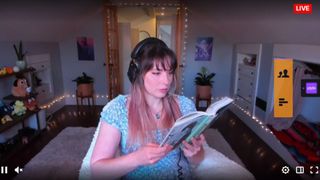
So what's next?
On Twitch, that's kind of down to the viewers and streamers. New metas will evolve, the algorithm will favour new content made by its creators and viewers will respond in turn. I tried several times to get a representative from Twitch to interview for this piece. After weeks of silence there was an eventual email confirming they would not set up an interview about the current state of the platform. Disappointing, but it's not a surprise knowing just how secretive the platform is about what it's working on and how it operates behind the scenes.
The controversial new revenue split, for example, may not happen, it's not uncommon that tech brands 'leak' information to see public response to test the waters. Who knows if we'll see it in play. But while Twitch rules the streaming scene, its population isn't going anywhere. They're there to stay.
Imogen has been playing games for as long as she can remember but finally decided games were her passion when she got her hands on Portal 2. Ever since then she’s bounced between hero shooters, RPGs, and indies looking for her next fixation, searching for great puzzles or a sniper build to master. When she’s not working for PC Gamer, she’s entertaining her community live on Twitch, hosting an event like GDC, or in a field shooting her Olympic recurve bow.
Most Popular

